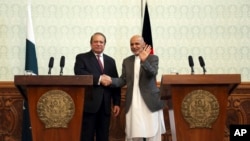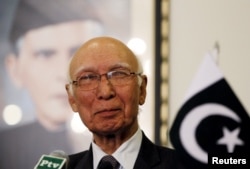Afghanistan rejected Pakistan's claim that it has disrupted some anti-Afghan terrorist operations within its borders, discounting it as "mere repetition".
Afghanistan noted that its own counterterrorism army disrupted the Haqqani terror network within Pakistan's border.
An Afghan presidential statement issued in Kabul said the main disagreement between the two countries is over the presence of terrorist groups - in particular the Haqqani Network - inside Pakistan.
“There is credible evidence that the leadership, command and control center, support infrastructure and sanctuaries of the Haqqani Network and other terrorist groups are inside the Pakistani territory,” the statement said.
It went on to say that the Afghan government has time and again provided “ample evidence” to the Pakistani government about the presence of terrorist networks inside Pakistan so that it could take action against the groups.
“Islamic Republic of Afghanistan reiterates that denial of these facts weakens the ground for cooperation between the two countries in the war against terrorism and the efforts strengthening regional peace and stability,” the statement said.
The Afghan government has again asked Pakistan to “sincerely” fulfill its commitments by taking “meaningful” actions against the Haqqani network.
The statement was in response to assertions Monday by Pakistan’s advisor on national security, Sartaj Aziz, that 90 percent of the Haqqani network’s infrastructure is located in Afghanistan and whatever was located on the Pakistani side has been uprooted or is being uprooted by the country’s military forces.
Kabul trip planned
Aziz is expected to travel to Kabul this week to attend a regional conference on Afghanistan and officials in Islamabad say that efforts are being made to arrange a bilateral meeting with Afghan counterparts to sustain the process of improving bilateral ties and removing mutual “misunderstandings”.
U.S. National Security Advisor Susan Rice, during her day-long visit to Islamabad Sunday, had urged Pakistani leaders to intensify efforts against the Haqqani network, describing it as a key point of friction in bilateral ties and Islamabad’s relations with Kabul.
However, Pakistani security officials dismissed those claims, saying an ongoing counter-military offensive near the border with Afghanistan has targeted all militants “without discrimination" and dismantled the terrorism infrastructure there.





